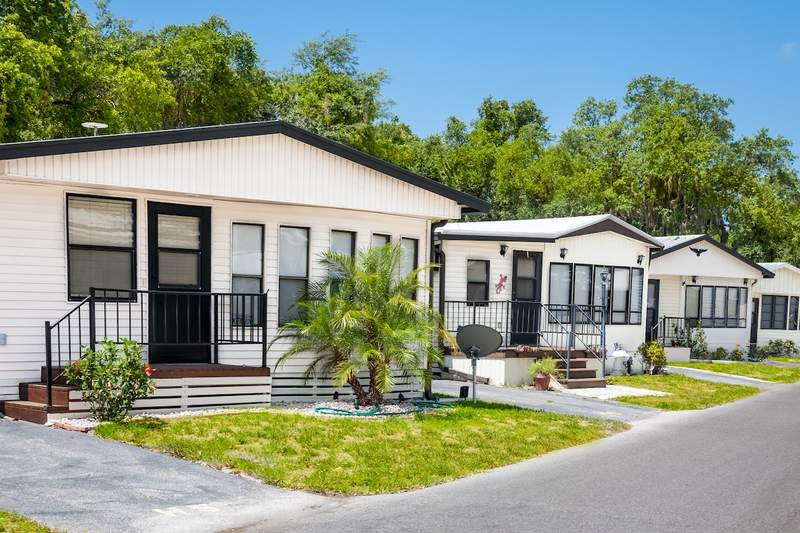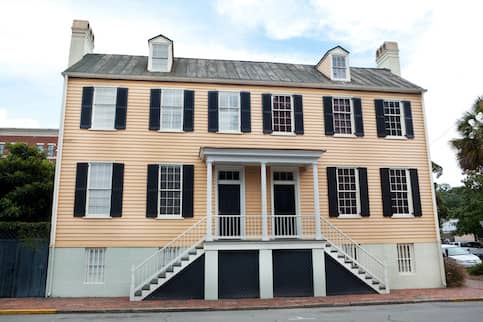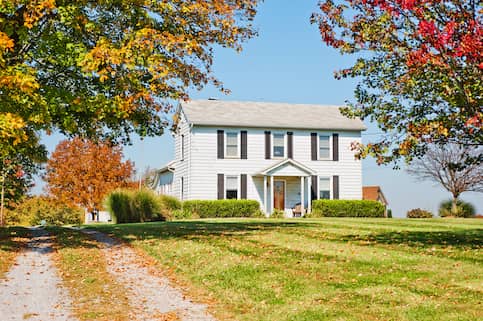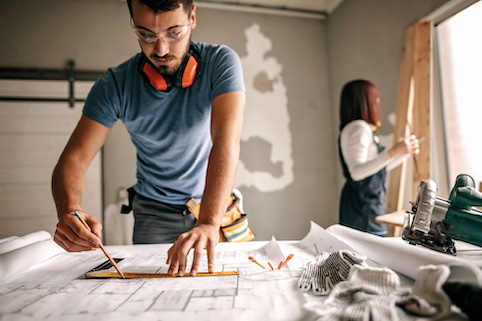Effective Nov. 16, 2025, both Fannie Mae and Freddie Mac no longer require a specific minimum credit score for conventional loan approval. Instead, loan decisions will be based on an analysis of overall credit risk factors.
As prices have climbed in recent years, aspiring buyers have turned to manufactured homes as an affordable alternative to the traditional single-family house. Buying a manufactured home – and land to install it on – differs slightly from the standard home buying process. If you think a manufactured home might be right for you, here’s what you need to know.
Key Takeaways:
- Buying a manufactured home can be an affordable alternative to purchasing a traditional house.
- If your manufactured home will be permanently connected to a foundation, you can buy the home and the land it will sit on with one mortgage and save money.
- If your home remains mobile, you will need one loan to buy the manufactured home and one to buy the land.
Can You Buy A Manufactured Home With Land?
Yes, you can buy a manufactured home and land together, and there are a few different ways to finance such a purchase.
“Most call it a land-home package,” says Erin Hybart, a real estate agent in Baton Rouge, Louisiana. “This option makes it simple for the buyer, but the opportunities may be more limited.”
Buying A Manufactured Home And Land With One Loan
If the manufactured home will be permanently affixed to the land, you can buy both the home and land with one loan. This will simplify things, and you won’t need to worry about making two monthly loan payments. Conventional, FHA, USDA and VA loans can be used to purchase a manufactured loan and land.
Buying A Manufactured Home And Land With Separate Loans
You will need two loans if you’re buying a manufactured home that is not permanently attached to the land. A manufactured home not affixed to a foundation is technically considered property – the legal term for this is chattel – rather than real estate, and cannot be financed with a standard mortgage. You will need what’s called a chattel mortgage for the manufactured home and a separate loan to buy the land. You also will need a chattel loan for the home if you plan to set it up on land you lease instead of own. Remember that buying a manufactured home and land with separate loans typically costs more than one loan.
What’s Your Goal?
Buy A Home
Discover mortgage options that fit your unique financial needs.

Refinance
Refinance your mortgage to have more money for what matters.
Tap Into Equity
Use your home’s equity and unlock cash to achieve your goals.
Types Of Manufactured Homes
There are several types of manufactured homes to choose from. Here’s what sets them apart.
Manufactured Homes Fixed To A Foundation
According to the Department of Housing and Urban Development, a manufactured home is a dwelling constructed in a factory after June 15, 1976, when federal construction and safety standards took effect. After construction, manufactured homes are delivered to their permanent location and attached to a foundation atop a metal frame.
Manufactured Homes Not Fixed To A Foundation
Some manufactured homes are set up without being attached to a fixed foundation, either because the owner wants the option of moving the home to a new location or because they don’t own the land.
Pre-existing Manufactured Homes
It’s also possible to buy a manufactured home that’s already been built and installed. This can save you money on installation costs over buying a manufactured home that’s brand-new.
Mobile Homes
According to HUD, a mobile home is a manufactured home built before June 15, 1976, and may not meet current federal standards for construction and safety. As a result, it can be challenging to get a mortgage for a mobile home.
Ready To Become A Homeowner?
Get matched with a lender that can help you find the right mortgage.
Considerations Before Buying A Manufactured Home And Land
To find a mix of manufactured homes and land that meets your goals, consider the following factors:
Home Size
Generally speaking, the larger the home is, the more it likely will cost. You’ll also want to consider the size of the plot of land that you want to buy. Some buyers may be happy with a smaller home if it means they have a larger yard to work with.
Location
The cost of real estate varies considerably by location. Even a small plot of land can be expensive in markets where demand is strong. You may get a good deal on a large chunk of land in more remote areas. You’ll also want to make sure the land you buy can accommodate a manufactured home.
“When buying a manufactured home and land together, ensure the land is zoned for manufactured homes, has access to utilities, and meets foundation requirements,” Hybart says.
Future Costs
You’ll need to prepare for the recurring costs of owning a manufactured home. This includes your mortgage payment, property taxes, homeowners insurance premiums, possible homeowners association fees, maintenance and repairs.
Take The First Step To Buying A Home
Find a lender that will work with your unique financial situation.
Specific Loan Options For Buying A Manufactured Home And Land
If you think buying a manufactured home and land is right for you, let’s go over the different ways you can finance your purchase.
Conventional Loans
Conventional loans are offered by private lenders and are not backed by the government. Conventional loans are the most common mortgage type. They typically cost less than FHA loans but come with stricter eligibility requirements, including the following:
- Minimum down payment: 3%
- Minimum credit score: 620
- Maximum DTI ratio: 45%
- Maximum loan amount: $766,550, $1,149,825 in high-cost areas
FHA Loans
Backed by the Federal Housing Administration, FHA loans are designed for borrowers with lower credit scores who can’t afford a large down payment. FHA loans tend to be less expensive for these borrowers than conventional ones. However, you’ll have to purchase mortgage insurance. To qualify for an FHA loan, you’ll need to meet the following requirements:
- Minimum down payment: 3.5%
- Minimum credit score: 500
- Maximum DTI ratio: 43%
- Maximum loan amount: $69,678 for home only, $23,226 for lot only, $92,904 for home and lot
VA Loans
Veterans Affairs offers VA loans to eligible military service members, veterans and their surviving spouses. There is no mortgage insurance required, but you must pay an upfront VA funding fee at closing that helps fund the program. Typically, VA loans require no down payment, but if you’re using one to buy a manufactured home, you’ll need a down payment of at least 5%. Here are some of the basic eligibility requirements:
- Minimum down payment: 5%
- Minimum credit score: No set minimum, but lenders may require at least 620
- Maximum DTI: 41%
- Maximum loan amount: No loan limit
USDA Loans
U.S. Department of Agriculture loans are offered to low- and moderate-income borrowers buying homes in specific rural areas. These loans require no down payment and can be a good option for borrowers who don’t have much savings. USDA loans also tend to be cheaper than FHA loans. However, you’ll need to buy a manufactured home in an eligible rural area. You’ll also have to buy mortgage insurance and pay an upfront fee. Here are some of the basic requirements:
- Minimum down payment: 0%
- Minimum credit score: No set minimum, but lenders typically require 620
- Maximum DTI: 43%
- Maximum loan amount: No loan limit
Chattel Mortgages
Chattel loans are used to buy personal property, such as a movable house or a vehicle. A traditional mortgage transfers the title to your name when you close, and your lender has a lien against your property until you pay off the mortgage. With a chattel loan, the lender still owns the property until you have paid off the loan. This makes it easier for them to reclaim the property if you default on your mortgage.
“A chattel mortgage is a loan for movable property, like a manufactured home,” Hybart says. “This loan is secured by the home itself. This type of financing is common when the home sits on leased land and usually comes with higher interest rates.”
Typical eligibility requirements for this type of loan include:
- Minimum down payment: 5%
- Minimum credit score: 575
- Maximum DTI ratio: 43%
- Maximum loan amount: No loan limit
Eligibility Requirements For Manufactured Homes By Loan Type
| Loan Type | Conventional | FHA | VA | USDA | Chattel |
|---|---|---|---|---|---|
| Minimum down payment | 3% | 3.5% | 5% | No down payment required | 5% |
| Minimum credit score | 620 | 500 | 620 | 620 | 575 |
| Maximum DTI ratio | 45% | 43% | 41% | 43% | 43% |
| Maximum loan amount | $766,550, $1,149,825 in high-cost areas | $69,678 for home only, $23,226 for lot only, $92,904 for home and lot | No maximum loan amount | No maximum loan amount | No maximum loan amount |
How To Buy A Manufactured Home And Land
If you’re ready to buy a manufactured home and land together, here are the steps to take:
1. Review Your Finances
A good place to start is by assessing your finances and figuring out what you can afford. Check your credit score to see which loan types you might be eligible for. Look at your savings and determine how big of a down payment you can afford. You also may want to look into down payment assistance for manufactured homes. You can also use a mortgage calculator to determine how much of a monthly mortgage payment you can afford.
2. Find A Location
Next, you’ll need to figure out where to set up your manufactured home. Finding the right plot of land will be an important part of the process, so make sure you select an area that meets your needs and priorities. It may be important to you to live near friends and family – or a reasonable commuting distance from work. The location you choose will also have a significant impact on how much you have to pay for the land, as land can be more expensive in high-demand areas.
3. Choose A Home Type
After you’ve picked a location, it’s time to select the type of manufactured home you want to buy. Perhaps you want one that’s fixed to a foundation or one that’s movable. Maybe you’d rather buy a manufactured home that’s already been connected to a foundation and previously inhabited. You’ll also be able to choose between different sizes and models of a manufactured home.
4. Decide On Your Loan Type
As mentioned, there are different ways to finance your manufactured home purchase. Your options are more limited if the home won’t be fixed to a foundation, as you’ll need a chattel loan for those homes. If you have good credit and can qualify for a conventional loan, it can be less expensive than an FHA loan. If you happen to meet the eligibility requirements for special loan programs like VA loans or USDA loans, that’s another way to save money.
5. Find A Lender And Apply
Be sure to shop around and get loan estimates from a few different lenders so you can compare terms and costs. The interest rate you’re offered will depend on factors such as your credit score, down payment, home location, loan term and market conditions. Once you’ve found the lender you want to work with, you’ll complete a formal loan application.
6. Close On The Loan
After you’ve submitted your loan application, your lender will conduct the underwriting process to review your finances. You’ll be asked to submit financial documents – including W-2 forms, tax returns and pay stubs – so your lender can assess your ability to repay the loan. If the lender determines that you meet their eligibility requirements, you’ll be issued final approval for the loan. You’ll finalize your loan at closing when you sign all the paperwork, make your down payment and pay your closing costs.
7. Have Your Home Installed And Move In
Once you’ve picked out the manufactured home you want to buy, you’ll work with the company to schedule installation. This may require some advance work to prepare the land. Also, confirm with the company that they will handle the installation and that the delivery costs are included in the purchase price.
FAQ
Here are answers to some frequently asked questions about buying manufactured homes and land:
The Bottom Line
Buying a manufactured home can allow prospective home buyers who have been priced out of the market to achieve their goal of homeownership. Manufactured homes are typically less expensive than traditional homes, and buying the house and the land as one purchase can help you save money. Manufactured homes aren’t for everyone, but they can be a helpful option for first-time buyers.
More From Quicken Loans:

Rory Arnold
Rory Arnold is a Los Angeles-based writer who has contributed to a variety of publications, including Quicken Loans, LowerMyBills, Ranker, Earth.com and JerseyDigs. He has also been quoted in The Atlantic. Rory received his Bachelor of Science in Media, Culture and Communication from New York University. He also completed the SoFi/Coursera Fundamentals of Personal Finance Specialization consisting of five courses: Introduction to Personal Finance, Saving Money for the Future, Managing Debt, Fundamentals of Investing, and Risk Management in Personal Finance.












